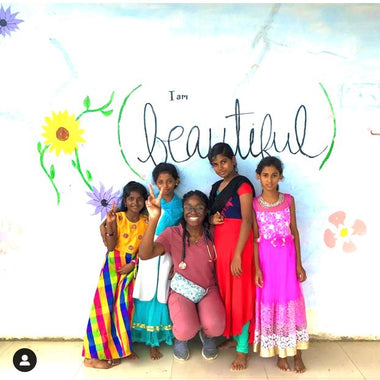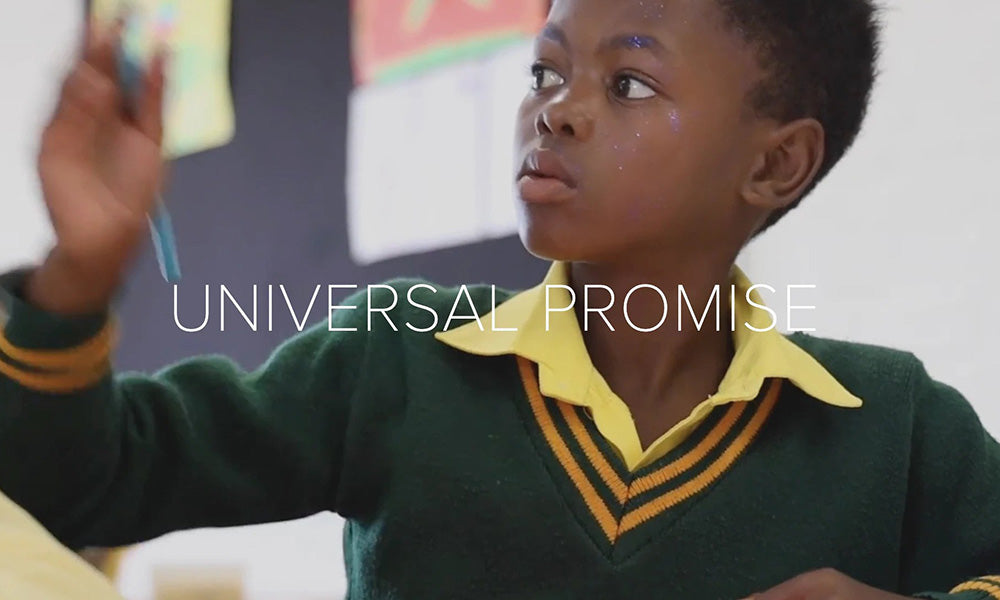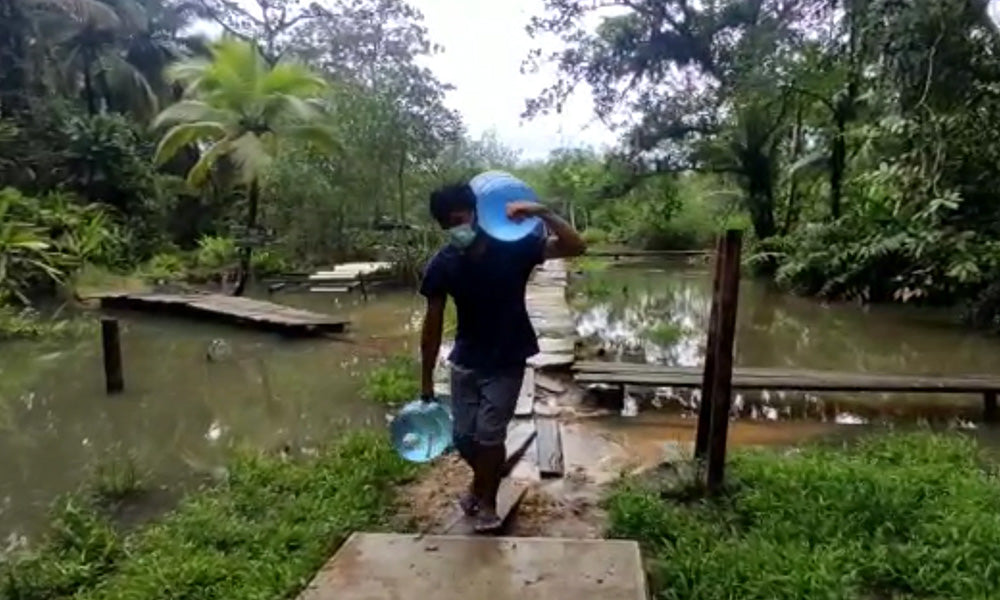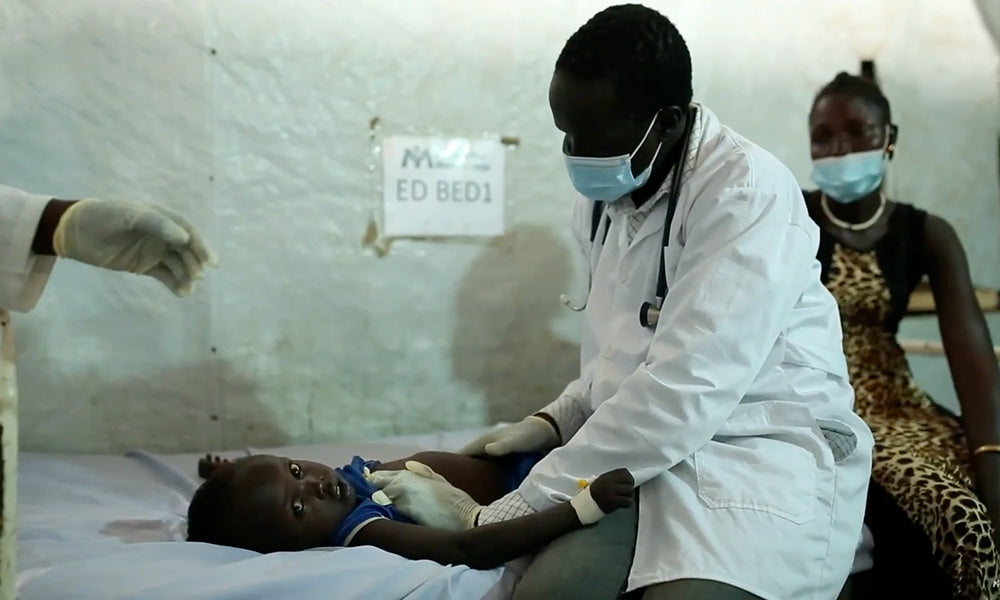CRAFTING WELLNESS STORY
Pediatric Oncology Nursing:Because Children Can't Fight Cancer Alone
"My patients are superheroes, the ones I believe in most." - Valeria R
@valerngl
@mdfinstruments
TRANSCRIPT
Valeria [00:00:00]
So I am a nurse, and currently I work as a pediatric oncology nurse hospital infantil
little new here in Mexico. It is a hospital that exclusively treats children with cancer and currently I work at the bone marrow transplant unit.
Children with cancer are very different from normal kids. They are like little adults, you know, because they are very tough and strong, but still
have the essence of a child because they are very innocent and playful. And yeah, I think those are the strongest people I've ever met them and
their parents of course.
Brooke Smith [00:00:54]
Hi, everyone, and thank you for joining our crafting wellness podcast. And today I
have the pleasure of introducing you to Valeria. Hello, Valeria, how are you?
Valeria [00:01:03]
Hi, Brooke, I'm doing very well. Thank you for inviting me today.
Brooke Smith [00:01:08]
Oh, thank you so much for joining us. So can you kind of just give us a little
introduction of yourself? Just let everybody get to know you a little bit.
Valeria [00:01:19]
Yes. So I am a nurse and currently I work as a pediatric oncology nurse hospital infantil
in Mexico. It is a hospital that exclusively treats children with cancer, and currently I work at the bone marrow transplant unit.
Brooke Smith [00:01:40]
Wow, so how long have you been doing this job?
Valeria [00:01:44]
This job for almost two years now
Brooke Smith [00:01:46]
That has to be an incredibly difficult, but also incredibly inspiring and beautiful
job.
Valeria [00:01:56]
Yes, it is. Yes.
Brooke Smith [00:01:58]
Can you tell us a little bit about how you found this job, like how you got into
nursing?
Valeria [00:02:04]
Yes. So I studied Universitat Autonoma the Great. It would is a public university in my
state, but actually the best one for nursing. Incredible. I studied for four years, and then after graduating, I started to work as a school nurse
and then also half of the time. The other half of the time I used to work with a pediatrician in Council three, and even then I didn't see myself
working with kids for my whole life. It wasn't until I started to work at Ito, which is where I work now that I found myself loving kids. And I
guess it's because children with cancer are so much different from normal kids, I guess.
Brooke Smith [00:02:51]
I bet. So when you were a school nurse, was that like elementary school like younger
kids as well?
Valeria [00:03:00]
Yes. Well, it was a school for like since kindergarten to high school.
Brooke Smith [00:03:05]
Then you went to work in pediatrics. Yes. OK. And then so how did you kind of find
the specialty with kids? Just wonder how you even come across oncology nursing with with children?
Valeria [00:03:19]
Yeah, I think it's a funny story, because when I was studying nursing and I went to my
clinicals, I remember when I was doing pediatrics as a clinical, I thought, I'm never going to work with kids. Like I thought it wasn't for me,
you know? But then my first job as a nurse was a school nurse, and then I used to work with a pediatrician. And as I told you before, I even then,
I didn't think I was going to work with kids for my whole life. But then I have a friend who works at the hospital that I work at, and he told me
about the job and I just applied and I don't know, I just fell in love with the kids in there and the job,
Brooke Smith [00:04:04]
they love that so much. I I know I've seen on your Instagram page just how beautiful
of a job that is to kind of be there for them during such a difficult time. So as a pediatric oncology nurse, can you tell us a little bit about
the day in the life of you?
Valeria [00:04:22]
Yeah, so well, it's like very different every day. I mean, it's not the same, but we get
assigned our patients. We can just have maximum four patients because the kids are, like, very complex so we can apply chemotherapy or they can
get critical pretty easily. So we have to be like super paying attention to them. They also get like a lot of transfusions and procedures. So I
think it's like every day, but right now I work at the bone marrow transplant unit and it's a little more like it's very different from the normal
hospitalization for the. kids.
Brooke Smith [00:05:14]
Talk a little bit about the bone marrow transplant unit and what that entails.
Valeria [00:05:19]
So bone marrow transplant is also called a stem cell transplant, and it is a therapy for
four children with cancer, mostly leukemia, but not exclusively for leukemia. And it is infusion of healthy bone marrow into the body to stimulate
new bone marrow growth is like a pretty complex therapy. We have to give the children high doses of chemotherapy to condition the body to make
space for the new bone marrow. And so kids also get, like very immunocompromised, so we have to take a lot of infection control. And yeah, so
there are two types of bone marrow transplant is autologous, which the patient, the old patient, kind of donates their own stem cells. And there's
also any transplant and it can be from a family donor or someone that is not related, but it's matched to it.
Brooke Smith [00:06:30]
It's a pretty stressful job because you're dealing with really innocent life and
very young life. And so I can imagine that doing that job kind of can be emotionally draining. Can you talk a little bit about what you do for
yourself to kind of balance when you have difficult days and kind of how you get through those?
Valeria [00:06:58]
Yeah, I think I'm very tough. I would say cause like I haven't had any issues with that,
dealing with that, you know, like I'm very good with separating job in my personal life, I guess. Of course, sometimes if my patient is not
feeling well, I don't feel well. And then I go home with like the feeling of knowing that my patient wasn't doing well or probably isn't in the
time.
Brooke Smith [00:07:29]
I think I think that's really a great perspective to have. And the more you can kind
of separate that as best you can because I know it's probably difficult to do. It's only going to make you stronger and, you know, a better nurse
because you can just kind of separate those, those those hard days and feelings. It was there's kind of a special studying for this to become a
pediatric oncology nurse.
Valeria [00:07:57]
Well, like of course, there's like as course or like special, like two years of
preparation or less. But I didn't like I just went to work in the hospital and I kind of trained in the hospital, and that's how I really become
one like by training every day. And still, I'm like learning every day.
Brooke Smith [00:08:22]
Can you tell us where you're where you are right now? Because I think I know where
you are, but I don't think anybody watching knows where you are.
Valeria [00:08:28]
Yes, right now, I mean, Mexico in specifically, which is a state that is like three hours
away from Mexico City.
Brooke Smith [00:08:38]
So can you tell us a little bit about just about you and like what you like to do
for fun and what life is like there for you in Mexico?
Valeria [00:08:48]
I mean, I don't think I have like a super fun life. Like when I work, I work in the
afternoons, actually. So during the morning, I don't actually have time for like a lot of things, but I kind of like to exercise and spend time
with my dogs, with my family. And then I go to work. I work for eight hours and then I go home super tired and I just go to sleep, you know? But I
think my favorite thing to do and what I'm most passionate about is traveling.
Brooke Smith [00:09:25]
Oh yes, traveling. Where? OK, so where have you been? That's your favorite place
that you've traveled to.
Valeria [00:09:33]
Yeah, so when I graduated from nursing school in 2017, I traveled with my best friend,
who also graduated as a nutritionist. So we went on a trip to Southeast Asia. It was like the best trip I've ever made and I think my favorite
country that I visited during that trip was Thailand.
Brooke Smith [00:09:59]
Oh yeah, I've never been to Thailand, but I've seen pictures and it seems extremely
beautiful.
Valeria [00:10:05]
Yeah, like, the landscapes are amazing, the people are super nice and the food is
delicious.
Brooke Smith [00:10:11]
Yeah, that's awesome. OK, so what is your bucket list travel? Where where's your
next when COVID is over and you have time because you've earned it through all of this? Where is the place that you want to go to next?
Valeria [00:10:26]
I have a dream to go to peru but to Machu Picchu someday. I also want to go to Africa to
a safari. I don't know. There's just like a lot of places that I want to visit.
Brooke Smith [00:10:39]
Did you grow up in Mexico? Is that where you're originally from?
Valeria [00:10:43]
Yes, I've been living here for my whole life. I just the semester abroad. During nursing
school, I went to Hope College in Michigan. I studied there for six months, actually. That's when I realized how different nursing is in the USA
from nursing in Mexico, though, and that experience actually made me want to become a nurse in the U.S. Hopefully sometime soon, I'm just a little
bit scared about the clicks.
Brooke Smith [00:11:18]
Oh yes, yes. And clerks, I know that's a hard task that everybody studies. Yeah, I
know, but I think you can do it. I believe in you. So that's an interesting point I love. I would love to hear a little bit more about your
experience when you came here to the U.S. to study abroad in Michigan. Can you explain a little bit about that experience and about how how it is
different?
Valeria [00:11:45]
Yes. So when I went to nursing school in Michigan for just six months. Yeah, I realize
how different everything was like. For example, the college life is so much different here in Mexico. I live at home and I just went to college.
And also, I remember in Mexico when I used to say I was studying nursing. People would ask me like, but why the and just wanted to be a doctor?
And, you know, like making nurses be less than a doctor because that's how nurses are seen in Mexico, more like an assistant for the doctor rather
than a teammate. And I remember when I was in Michigan and people would ask me about my major and I would say nursing. I would always hear some
very positive comments like, Wow, you must be superintelligent. Wow. Nursing is super hard. And that made me realize how nurses are seen. And
that's actually how you want to be seen as because it's true,
Brooke Smith [00:12:54]
it's absolutely true. I have spoken to so many nurses who were on the path to become
doctors who got into medical school, who were doing that and then changed their mind. There's definitely a certain calling that nurses have that
they're there for you during the most difficult times of your life and sometimes the most happy times of your life. But they're the kind of there
for you when you're scared and alone and. They're kind of just feel like an angel. You know, like they're called angels of health care for a
reason because they definitely feel like that. I know that as myself as being a patient in the past, I had an amazing nurse when I was in the
emergency room, when I was young and I was in California by myself and I woke up in the E.R. and I had this amazing kind nurse who like, put socks
on my feet. And he he was the kindest soul to me, and he comforted me in a way that I couldn't explain because I was away from my family and
didn't know what was wrong with me and and just the care and the love and the just just knowing that he was great at his job and he could take
care of me. And it just brought a level of comfort I can't express. And that's kind of where my love of nurse for nurses came from. So it's
definitely a genuine love, but I think I think you make a really great point that nurses aren't assistants, your a team, teammates, and we need
everyone in order to to do their jobs in order to get people healthy and on the right track in every role is is just as important.
Valeria [00:14:39]
Yeah, that's why I think so too. Yeah. When people ask by you and I started to be a
doctor instead, it's I just say it's very different. Like, it's not that they are more than us or anything. It's just very different.
Brooke Smith [00:14:54]
So if you have any advice for people who are interested in getting into nursing and
or maybe getting into specifically pediatric oncology nursing? Do you have any advice for those people who are watching this video right now who
kind of want to know?
Valeria [00:15:15]
So I would say the health care is, like, very complex and difficult sometimes, but it's
totally worth it. And I would say just explore the like specialties like look for the E.R., surgery, pediatrics, and then get to know which one is
your. place in that I wanted to be in surgery, but then I found myself working with kids was my place to be.
Brooke Smith [00:15:50]
Yeah, I think it's a lot of like trial and error, right, pediatric oncology nursing,
and then you could try to start that path and then realize, you know what? No, actually, I want to go into surgery or I want to go on to this
other, this other specialty because I think with nursing, the important thing to remember is there's so many different paths that you can go down
so many different specialties. And I'm kind of learning it along while I do this podcast speaking with all different kinds of nurses. Kind of
learning all about the specialties. And it's really fun because I'm learning along with everybody watching as well all the options that you guys
have when it comes to pursuing nursing. And also when it comes to pursuing how high you want to take the nursing education because you can do two
years, four years, you can you can just keep going and learning and growing as a nurse. And I think that's one of the most beautiful things about
nursing is that you have the control to to exactly choose whatever path you want and to take your education as far or as little as you want. And
that's just up to you.
Valeria [00:16:52]
Yeah, I agree with you, Brooke. Yeah, nursing is like very diverse, so you can go to the
bone marrow transplant or the ICU. I mean, it's like very diverse court nurses
Brooke Smith [00:17:08]
I would love to just ask you to come over here to become a nurse over here in the
states. Do you know what that process is like or is that something you're pursuing currently pursuing or just a dream that you want to pursue in
the future?
Valeria [00:17:27]
I know the process. It's pretty complex, and that's probably why I haven't done it first.
I have to kind of reevaluate my studies, so I have to do something in the CFMGS thing I don't really know very well. And also, of course, I have
to yank legs. And then when I have like RN is unsure. That's how it's cool. Mm-Hmm. I would then just apply for a job, and it sounds super easy,
you know, like by just say you need the doing needs, it's a challenge.
Brooke Smith [00:18:08]
Have you ever thought about travel nursing? Because here in the US, travel nurses,
they kind of get to pick up and go to different places and and work for short shorts, periods of time, sometimes six months, sometimes longer, and
then they pick up and then they go somewhere else. Have you ever thought about that or is that just completely separate from your specialty?
Valeria [00:18:33]
Well, that's not something we do in Mexico, but I learned about it when I was in
Michigan. I knew that was a thing, and I always thought that was very cool. But I don't know. I had never thought about going into that path. I
just felt like I found what I want to do with my life, which is like, I don't see myself doing anything else anymore. If I ever go to the U.S., I
would totally want to work as a pediatric oncology nurse somewhere else.
Brooke Smith [00:19:05]
I love that. I love that you know what you want. And it's funny because the more
people I talk to, it's like once they find their kind of niche, once they find their spot where they like their heart tells them, this is it, like
I know where I'm supposed to be. And then there's no there's no really other thing. It's like, you just know it. And after speaking with you, I
can tell you're exactly where you're supposed to be and where you're meant to be and where your heart has led you. So I think that's really
beautiful. And I know that all those children are so lucky to have you and have a caring nurse by their side, helping them through all their
battles, because I know that that's not easy to go through.
Valeria [00:19:47]
Yeah. Thank you, Brooke. Yes. Children with cancer are very different from normal kids.
They are like little adults, you know, because they are very tough and strong, but still have the essence of a child because they are very
innocent and playful. And yeah, I think those are the strongest people I've ever met them and their parents, of course.
Brooke Smith [00:20:16]
I've enjoyed having you so much on this podcast, and I definitely want to link all
of your information. We're going to put her Instagram handle in here and any other handles that she might have down in this video below. So please
go check Valeria out. I know that if you have any questions or want to chat with her, I'm sure that she's open to talking with you guys. If you
want to learn more about pediatric oncology nursing, I'm sure she'd be happy to tell you what that experience is like.
Valeria [00:20:44]
Thank you so much, Brooke.
Brooke Smith [00:20:46]
Thank you so much for joining our Crafting Wellness podcast.
WELCOME TO THE NEW SCHOOL.
LET'S ROLL
BE THE CAUSE
This is our oath and we need you. The WORLD needs you. We need your heart, your mind, your skills, and your partnership
MORE CRAFTING WELLNESS STORIES
IN HONOR OF OUR WELLNESS HEROES
Cal State San Marcos
On Martha's recent trip, her team of 40 healthcare professionals used their MDF Instruments stethoscopes, sphygmomanometers and reflex hammers to provide medical attention to the community. Their focus on this mission was concentrated on obesity, hypertension, diabetes, tuberculosis and HIV/AIDs.
View DetailsFloating Doctors Panama 2022
Imagine packing up supplies, flying to another country, hopping in a car to the nearest dock to then venture across waters to then set up a med clinic for a community of whom does not speak the same language you do. This is nothing more than a routine endeavour for the Floating Doctors organization. The journey these missionaries take is indescribable, going through the moody rain and beating sun is everything except a sign to go back, and a motive to move faster.
View DetailsInternational Medical Corps
Each year International Medical Corp rushes to the front lines, committed to being first responders to the world's most crucial disasters. With a focus on healthcare, nutrition, shelter and protective services they seek out humanitarian disasters and rush to the scene, dedicated to those affected and providing relief.
View Details








